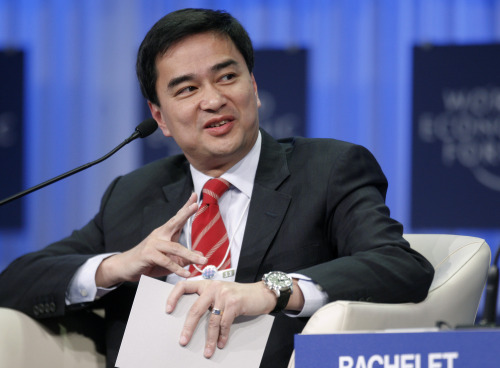Thailand’s ruling coalition is leading in opinion surveys and ready for an election that will bring stability and redress complaints that spawned violent protests since 2008, Prime Minister Abhisit Vejjajiva said.
“Looking at the polls, the government is slightly ahead,” Abhisit told Bloomberg Television in Davos at the World Economic Forum, without naming the polls and adding that a win can’t be taken for granted. “What’s good for the country is that we have free, fair elections soon, and the Democrat party and the government is ready to fight those elections.”
Abhisit, 46, is aiming to lead his Democrat party to its first election win in about two decades, a result that would allow him to counter criticism from opponents aligned with former leader Thaksin Shinawatra that he lacks a popular mandate. Disputes over the outcome of the last election in 2007 fueled protests in the country of 67 million citizens that killed about 100 people and soured the investment climate.
 |
Abhisit Vejjajiva |
Abhisit took power in a 2008 parliamentary vote after a court disbanded the pro-Thaksin ruling party for election fraud. He has twice called on the military to disperse protesters aligned with Thaksin known as the Red Shirts who have pushed for an election, most recently last May in demonstrations that claimed about 90 lives and led to arson attacks in Bangkok.
“The elections themselves would be a partial if not a complete answer to those grievances,” Abhisit said in the interview, recorded on Jan. 28 and broadcast today. “Once the elections are done, the Red Shirts will have to admit that we’ve gone through a round of a democratic process, and therefore whoever wins the election should have the right to govern.”
Since the military ousted Thaksin in a 2006 coup, courts have disbanded two parties linked to him and banned more than 200 of his political allies from standing for office. Thaksin-affiliated parties, which won the most seats in the past four elections, have been unable to stay in power for more than 18 months after their past three victories.
“If the Abhisit government wins, it will be fine because the military is on their side,” said Pavin Chachavalpongpun, a visiting research fellow at the Institute of Southeast Asian Studies in Singapore. “But what if the Red Shirts and Thaksin win? I don’t know whether the traditional Bangkok elite would be fair enough to say ‘okay, this time we’ll accept the result.’”
Thailand’s benchmark SET Index, Asia’s fourth-worst performer this year after the Philippines, Indonesia and India, dropped 1.2 percent as of 11:09 a.m. local time. It has lost 7.8 percent on regional inflation concerns since reaching a 14-year high on Jan. 6.
The baht lost 0.4 percent to 31.17 per dollar today. It has dropped 3.8 percent this year, the worst performance among Asia’s 10 most traded currencies outside Japan.
Thailand, a manufacturing base for automakers including General Motors Co. and Toyota Motor Corp., saw foreign direct investment fall 33 percent to 236.03 billion baht ($7.6 billion) last year, while investment inflows into neighboring Malaysia more than tripled to $7 billion.
The Thai central bank raised its benchmark rate for the fourth time in seven months to 2.25 percent on Jan. 12 as economic growth, rising wages and commodity prices fueled price pressures. The bank estimated last week that Southeast Asia’s second-biggest economy expanded 8 percent in 2010, which would be the fastest pace in 15 years, and may grow between 3 percent and 5 percent this year.
That pace of growth is “acceptable,” Abhisit said. “It’s enough to make sure we sustain the level of employment, while it’s not too inflationary.”
Thai lawmakers last week approved minor constitutional changes that would change Parliament’s composition and make it easier to sign treaties. The amendments face a final vote on Feb. 11, after which Abhisit said he’d consider an election, barring violence or a censure motion.
“If we can preserve stability despite the fact that we’ve lifted the state of emergency and no longer use special laws, it will be a good time for the country to return power to the people,” Abhisit said. Parliament’s term expires on Dec. 23, according to the constitution.
The prime minister defended himself against claims made by yellow-shirted nationalists who backed his rise to power in 2008 that he has ceded territory to Cambodia. About 2,500 people have blocked a Bangkok street since Jan. 25 to pressure Abhisit to take tougher measures against Cambodia in a border dispute.
“The majority of people will look at the issue on its merit,” Abhisit said. “On the whole what the government has done has been to protect the interests of our country.”
No Clear Leader
Since the last election, the Democrat party has increased its lawmakers in Parliament to 172 from 165 through by-elections, while the pro-Thaksin Puea Thai has seen its seat tally reduced to 187 from 233 because of defections and disqualifications. Thaksin has lived overseas since fleeing a jail sentence in 2008, and Puea Thai lacks a clear leader.
“This is an election year,” Abhisit said. “All the parties are now focused on the upcoming election, so I think there will be continued stability.”
(Bloomberg)








